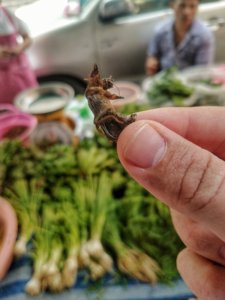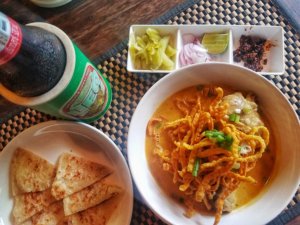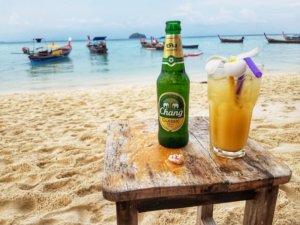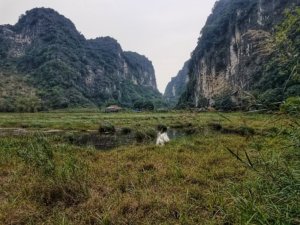Gaining and losing weight is a normal part of travel. But travel is not the time to focus on being obsessively healthy and watching your weight. There is far too much good food and drink in the world to waste valuable time eating celery and passing on a local delicacy because it’s a little fatty.

Food and drink is an open window into another culture. Don’t close the window! Tasting and sampling the best eats can still be a part of healthy travel.
Contents
Understanding Healthy Travel
To gain the greatest understanding of a new place and make the best of any travel experience, it’s best to dive in head first. The best travel experiences involve self-discovery of new tastes, late nights with new friends and plenty of local beer.


However, there is no denying that this lifestyle of frivolous eating and drinking adds up around the waistline.
Personally, I know firsthand what it’s like to travel for months and come home to find an entire wardrobe has shrunk. Okay, so it wasn’t my clothes that changed sizes. Maybe, just maybe, it was the beer and eating everything in sight. But that’s just a theory.
I also know what it’s like to travel halfway around the world and, suddenly, my clothes are baggy and pants are falling down.
As a person whose weight tends to fluctuate, and having experienced both ends on the spectrum of gaining and losing weight during travel, I decided to share ways to travel healthy and curb the weight gain. It’s easy for anyone to limit weight gain without sacrificing the joys of eating new foods and having fun with new friends.
A Healthy Hangry Backpacker?
A quick background about myself and my experiences:
The first time I went solo backpacking was in Europe. My expectations regarding healthy travel and gaining or losing weight were none. It never crossed my mind until I met up with my sister in Prague, who immediately commented that I appeared thinner. I was surprised. For a month and a half, I never thought twice about what I was eating or drinking. By the end of that first international backpacking trip, my weight loss was around 20-30 pounds.
The most recent backpacking trip was to Southeast Asia. This was the opposite experience. In Southeast Asia, although aware of what and how much I consumed, the added poundage was significant. After losing about ten pounds in the first month, I proceeded to gain at least 30 pounds (okay, probably 40-plus) over the next several months.
What was the difference? To keep it simple, I ate more, ate worse and drank a lot more beer. All while being less active. There were additional factors of a carb-heavy diet, less walking in the heat of Southeast Asia and regularly eating massive breakfasts (unusual for me). It boils down to consuming more and moving less. Weight loss/gain really is that simple.

In hindsight, analyzing these two extremes of travel – gaining and losing weight – helps me to understand the importance of healthy travel. And it reiterates lessons learned.
My education background (Bachelor of Science) is in kinesiology. Studying kinesiology at Louisiana State University was a great experience where I learned a lot about health and fitness. Although I am not the most ardent practitioner of my studies, the general principles of kinesiology and healthy living are fresh in my mind when I consider healthy travel.
Healthy Travel: How to Limit Weight Gain
Healthy Travel is Knowing What You’re Eating
This one is crucial. Too many foods – delicious, exotic foods – taste and sound like they would be healthy options for a meal. Too often, they are not.
It’s like eating a salad. It’s healthy, right? Well, it starts out healthy. As soon as you add cheese, croutons, avocados and ranch, that healthy bowl of leaves has more calories than a cheeseburger. Go for the cheeseburger. Sometimes, a cheeseburger is just something you need.
To limit calories and fats, skip the fries. If you’re like me, most fries are a disappointment anyway. The health value is nonexistent, and you can either save the calories or have a beer or two for the same damage.

Hidden calories are a common reality in many of our favorite travel meals.
Knowing what you’re eating is the first step of healthy travel. It’s important to consider that some of our favorite travel eats are unhealthier than we imagine. And others, thought to be fattening or junk food, aren’t so bad after all.
For example, take coconut curry. This popular Asian dish is a bowl full of chicken, rice/noodles and veggies in a heavenly coconut curry broth. Sometimes there is a spicy kick, and it usually settles as a light meal. How could it be bad?
Hungry travelers are surprised to learn that their fresh bowl of coconut curry can easily contain a thousand calories.
Vietnamese coffee and Thai iced tea are popular beverages in their respective countries. Each contains a base, coffee or tea, that is nothing special. It’s the fillers and mixers of these drinks that add up. Each is sweetened to the extreme. Any notion of being a morning pick-me-up or afternoon refresher is false. More accurately, they are coffee/tea-flavored cups of condensed milk, packed with sugar and calories.

The point is to consider what you’re eating. Unhealthy foods are not always deep fried. To travel healthy and avoid gaining weight, do a little research on your favorite travel eats before stuffing your face over and over.
Knowing what you’re eating does not mean foolishly replacing the spoils of travel with celery and kale. It means being aware. Food and drink is the best part of travel, and you should always strive for new experiences and eat the good foods.
Get Moving!
The easiest way to limit weight gain is to move! And keep moving! This is true whether you are at home or halfway around the world. Being active means burning calories, and that means being less blob-like.
How do you stay active halfway around the world? It’s easy!
Healthy travel starts with walking. Too often, travelers get lazy on the road. Walking is a passive method of healthy travel. Going from one location to the next doesn’t always require a taxi, bus or subway.
Walking one mile takes about 20 minutes at a normal pace. One mile in a taxi takes less than five minutes in most cities. The difference is not 15 minutes. The difference is a few dollars and a mile of sights and sounds. All missed in a taxi.
Unless you’re in a rush, avoiding danger, physically unable or ill, walk those few miles.
Consider the times you’ve gone to the top of a hill or other viewpoint. Viewpoints often have an easier route to the top. But if you take the easy way up, you miss out on an opportunity to passively burn calories.
Passive exercise, burning calories in normal daily activities, is the best way to earn the extra beer, dessert or fried ball of mystery on the street. You still reach the destination; however, by walking, you burn calories, save money and see more of your destination. And it only takes a few extra minutes.
Drink in Moderation…ish
Alcohol is one of the biggest obstacles to healthy travel. After saving up for months for a backpacking trip, or taking a much-deserved vacation, it’s easy to let loose and enjoy a few drinks. And then a few more. Every single day.
There’s nothing wrong with enjoying a few more cold ones than normal when traveling. Unfortunately, this is a slippery slope. It’s easy to get into a routine of having a beer with every meal. In cheap destinations like Southeast Asia, it’s even easier when beer is a dollar or less.

All of those beers and cocktails add up to thousands of empty calories. After weeks of imbibing, the result is several additional pounds. How can you limit the alcohol-calorie intake? Moderation is the obvious choice.
If you want to travel and avoid gaining weight, there’s a simple solution that works for a lot of travelers: don’t drink so damn much. For those lucky individuals who are hangover-immune or have freakish metabolisms, do what you must. For most of us, however, excessive drinking leads to excess weight gain.
I hate to be that person, but keeping count of your drinks can really help put into perspective the calories consumed and money spent on alcohol. Do this for a day or two. Factor the calories. Consider how you’ll feel returning home with additional baggage around the waistline. Then decide if the extra beer or three is necessary.
Inverse weekends are an alternative, happier option. Rather than guilt-inducing counting of drinks, try an inverse weekend. Behave as you normally would while traveling, enjoying food and drinks for four or five days. Then, take a break for two to three days. Regular spells of sobriety will keep you fresh, more energetic and save money. Most of all, breaks from binging help to ensure healthy travel.
By no means am I suggesting that anyone should go out and try to drink almost every day of a trip. The point of drinking on an inverse weekend schedule is for those who are tempted to grab a beer at every opportunity when traveling. If you tend to gain weight when traveling, it’s only logical to take breaks from the booze and drink more water.
Beer in Southeast Asia and Eastern Europe is cheap. Wine in France is unbelievable. Beaches are made for cocktails in coconuts. The temptations are strong, but moderation is important for healthy travel.
Explore Nature
Travel is supposed to be fun. And healthy travel is all about staying active. Why not have fun and burn some calories in the process?
When you’re in a big city like New York, London or Bangkok, escaping to nature is a challenge. That’s when walking (mentioned above) is the healthy choice to avoid gaining weight from all the pizza, fish n’chips and tasty street food. In more modest destinations, take advantage of the surrounding outdoors.

Go for hikes to find a great view. Rent a bicycle and explore the countryside. If it’s a beach setting, go snorkeling or try your hand at surfing. These are a few easy examples of ways to have fun and maintain health.
The best part of being active in the outdoors is the reward. Edinburgh is cool, but the Scottish Highlands are stunning. The sights and sounds of Hanoi are incredible, but Ha Long Bay is a natural masterpiece. Cities are great – wandering massive cities is one of my favorite travel activities – but there is no comparison to the wonder of nature.
One of the highlights of traveling abroad is experiencing nature that is different than home and witnessing the wonders of the natural world. It’s important for healthy travel to be fun, and the great outdoors has the best combination of healthy and fun.
Are You a Crazy Person?
Some travelers are crazy. I’m not referring to party-animal backpackers. They are crazy, but I’m talking about those crazy people who travel and bring workout clothes. And then they actually work out.
We’ve all traveled somewhere and thought, “They have a gym. I’ll bring my running shoes.”
How many times do we actually wear those shoes? Most of us are wasting valuable packing space with our misguided belief that we will dedicate time to working out. Not to sound like a pessimist – well, I am a little pessimistic in nature – but this is being realistic. For most travelers, packing running shoes and gym attire is wasting space.
For more on travel packing: check out this series on packing light and packing right.

If you are one of those people who will go for a run in tropical paradise, or wake with early birds for a workout, I applaud you. Doing this while traveling makes you a crazy person, but at least you’ll be a healthy traveler.
Some travelers are not going to take this advice and walk everywhere. And they aren’t going to drink less or consider what they’re eating. If you are one of these people, but you will devote time to working out, bringing workout attire may be a viable option for healthy travel.
For most of us, we are incredibly unlikely to exercise abroad. That’s why I suggest passive exercise and exploring surrounding nature. For the crazy people, enjoy your run!
Personal Methods for Healthy Travel
What do I do to combat gaining weight and travel healthy?
For starters, I’m not great about eating healthy when traveling. If it smells good or looks enticing and unusual, I’m going to eat it. Eating new foods is my thing. And I’m often the first one to order a second beer and try an unfamiliar brand. These are areas that need improvement in the future.
Through experiences gaining and losing weight on the road, this is what works for me:
Small breakfasts. Yes, I know, everyone loudly exclaims how a big breakfast is such an important meal for brainpower, metabolism, etc. Well, that doesn’t work for me. A small breakfast, toast and black coffee, is enough to get me going. Plus, I’d rather have an empty stomach as I wander a strange place, ya know, to avoid the possibility of a full English breakfast exacting revenge on my bowels at an inopportune time.

Walking everywhere. I really do walk a lot when I travel. Twenty miles in a day is not uncommon. If there is something I want to see, I’ll usually walk. Even if it takes an hour or more, I save money and burn calories by walking. As a bonus, I see places that I would otherwise miss by taking a taxi or subway. Getting lost is fun, too!
Eat fresh foods. It’s easier to eat fresh foods outside of the United States. This does not always ensure weight loss, as a lot of fresh breads, fruits and cheeses are packed with calories. But eating fresh food is a part of healthy travel.
As I continue to travel, I learn what works best for me and the areas where I can make healthier choices.
Fun, Healthy Travel
Healthy travel is an obsession for some, but there is more to travel than highly-edited photos of a super-fit subject ridiculously posing on a beach. Healthy travel should be fun, and fun travel means eating the good stuff and seeing the cool sights. It doesn’t have to be pretty.
Walking is the start of managing weight when traveling. Drinking in moderation and knowing what you’re eating are equally important. Finding fun activities to see more of your destination makes traveling healthy easier.

At the end of a journey, utilizing these tips for healthy travel will lead to a healthier, happier state of mind. Even if the scales show a little weight gain, that’s okay. It happens to almost everyone. The key to healthy travel is to not lose control and limit the damage.
Leave a Reply
You must be logged in to post a comment.